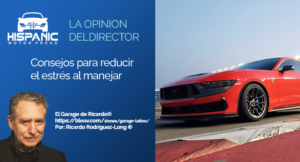One of the highlights of the convention was the presentation from Ken Gronbach. Once he was on the stage, It took him about 5 seconds to look around and tells us that we are doing something wrong. As a demographer, his world is all about the data, and you know that the data never lies. America’s experiment on democracy includes the freedom of religion and the diversity of its people. These concepts are being reminded at every monument of our capital. And he is right. The world is changing right before our eyes, and our approach toward the inevitable change in our country’s population will make a difference not just in selling the product but in staying in business.
Mr. Gronbach left me with some questions of my own, and thanks to the Ford Motor Company, I was able to talk to Miguel Mansilla, one of the analysts looking into the future for the trends in technology and the people. The carmaker has been collecting data for over a decade, and the latest report includes data from sixteen countries. All this is sorted by demographics (regions, generations, etc.). We all learned something from the presentation in Washington D.C., but some of the data that Mr. Mansilla shared with me is pretty alarming.
Generation Z, which includes the people born in mid 1990s onwards, is the most tech-savvy in history. The internet and social media are a big part of their identity. They can create apps (Software) to solve complex problems by simply writing code. Never have the need to use a screwdriver, much less a crescent wrench. Their approach is hard to understand if you are a Baby Boomer (born between 1946 to 1964).
What got my attention is that 64% of them feel lonely regularly. Almost 40% of them reconsider where to live after the pandemic. And 63% found the changes they had to make during the pandemic a lot harder than they had imagined. Seventy-seven percent of women feel overwhelmed by the changes that are taking place in the world. This data reveals that we have a brilliant but socially stressed generation.
Seventy-five percent of parents globally agree that they rather have their children in a self-driving vehicle than ride with a stranger. That is quite a change in the perception of what it is like to live in a social environment.
This is fascinating data that we need to start considering to prepare for the future. As of 2022 forty-four percent of people no longer enjoy shopping, meaning going to a place to make a purchase. For example, Australia had to change its postal courier delivery vehicles because most of the mail is no longer letters but parcels / boxes of products. Across the globe, the demand for pets has tremendously increased to help with loneliness issues. How do you safely transport pets that are sourced online? That is a transportation problem that needs a solution.
Innovation will continue to accelerate as the demand for products and services we never thought of will present in front of us. For that reason, we need diversity in people’s age and ethnicity that can provide a different point of view on the obstacles we have yet to recognize.


